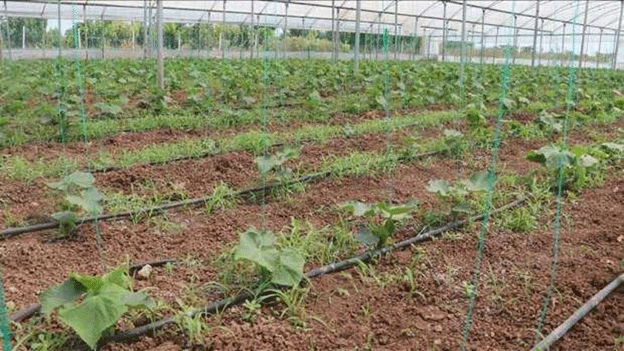Since 2011, Batman, a city known for its hot climate in the Southeastern Anatolia Region of Turkey, has become a growing center for greenhouse farming. With government support, 543 greenhouses have been established, covering an area of 550 acres. These greenhouses primarily produce high-demand vegetables such as cucumbers, tomatoes, and leafy greens, supplying not only Batman but also nearby provinces in Southeastern and Eastern Anatolia. This initiative has boosted local food production and reduced dependence on long-distance imports from major agricultural hubs like Mersin and Antalya.
Mehmet Aydın, Director of the Provincial Agriculture and Forestry Department, highlights the benefits of local greenhouse production. “In recent years, rising logistics and transport costs have added significant expenses to vegetables imported from distant regions,” says Aydın. “By expanding our own production capabilities, Batman can meet local demand and even supply neighboring provinces.” Batman’s greenhouses currently yield an annual 20,000 tons of vegetables, and farmers in the region are expected to generate around 65 million Turkish lira in revenue this year.
Expanding the Vision: Agricultural Greenhouse Organized Industrial Zone (OSB)
To further strengthen the greenhouse industry, Batman’s Agricultural and Forestry Directorate is actively working to establish a specialized Agricultural Greenhouse Organized Industrial Zone (OSB) in the Kocalar village area. The OSB is designed to significantly increase greenhouse production capacity and efficiency by incorporating advanced technology. This new zone will cover 1,000 acres, with each greenhouse occupying a minimum of 5 acres. Unlike traditional plastic tunnel greenhouses, these will feature automated systems for temperature and humidity control, enabling year-round production of crops like tomatoes, which require specific climate conditions.
The establishment of this OSB is expected to create 100 greenhouse units, leading to the employment of at least 300 individuals, providing livelihood opportunities for 100 families, and improving the region’s overall economic prosperity. The project is still in the feasibility study phase, but Aydın is optimistic about the impact. “Our goal is to transform Batman into a greenhouse city, enabling farmers to produce a variety of crops throughout the year. This would not only boost agricultural output but also improve the quality of life for our farming community,” he explains.
The Economic Impact of Greenhouse Farming
Greenhouse farming has proven to be a lucrative venture for many farmers in Batman, including Veysi Türkeli, who began his greenhouse business with government support on just one acre in 2013. Today, Türkeli has expanded his operation to six acres, producing cucumbers and tomatoes during the summer and leafy greens like lettuce, parsley, and dill in the winter. “We rely entirely on greenhouse farming for our livelihood, and we sell our produce both in Batman and surrounding provinces,” says Türkeli.
Farmers like Türkeli exemplify the success of Batman’s greenhouse farming initiative, which has allowed them to scale their operations, diversify their crops, and secure steady income throughout the year. This approach to sustainable agriculture is particularly valuable in regions where outdoor farming is vulnerable to weather extremes, making greenhouse production an ideal alternative for both food security and economic development.
The success of Batman’s greenhouse farming sector underscores the importance of government support in fostering sustainable agricultural practices. By reducing dependency on imports, increasing local production, and introducing modern technologies through the proposed OSB, Batman is positioning itself as a key player in regional vegetable production. This initiative not only benefits farmers by improving their income but also strengthens the local economy and provides healthier, fresher food options to consumers. With continued investment and innovation, Batman’s greenhouse farming sector is set to play a significant role in Turkey’s agricultural future.










